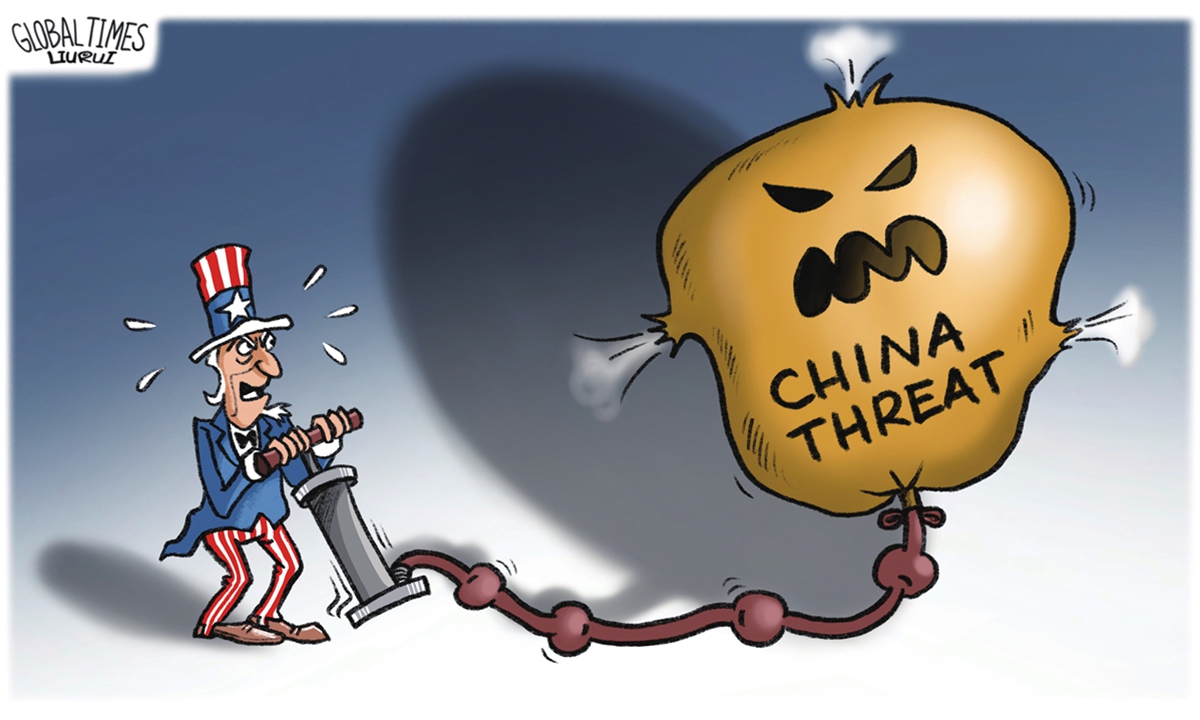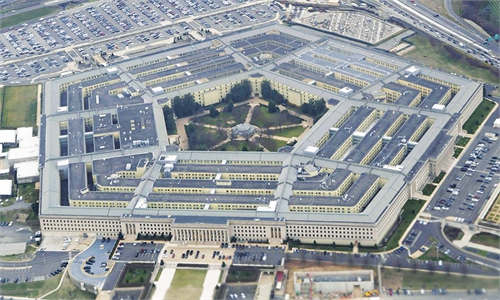
Bloated hype beyond all reason. Illustration: Liu Rui/GT
Chinese Foreign Ministry spokesperson Lin Jian on Thursday slammed a report released by the US Department of Defense titled "Military and Security development involving the PRC," saying that "like the ones we've seen before, it lays little emphasis on truth."
The report is filled with bias and designed to amplify "China threat" narrative only to justify the US's desire to maintain military supremacy, Lin noted.
In a report released on Wednesday local time, the Pentagon outlined "the importance of meeting the pacing challenge" presented by China's increasingly capable military.
It also hyped China's buildup of nuclear weapons, saying the Pentagon estimates that China has surpassed 600 operational nuclear warheads as of mid-2024 and estimates it will have more than 1,000 by 2030.
It claimed that Beijing "may also be exploring development of conventionally-armed intercontinental range missile systems" and "if developed and fielded, such capabilities would enable the PRC to threaten conventional strikes against targets in the continental US, Hawaii, and Alaska."
Lin Jian said at a press briefing Thursday that China is fully committed to being a force for peace, stability and progress in the world. "We are equally determined to defend our sovereignty, security and territorial integrity."
We call on the US to abandon the Cold War mentality and hegemonic way of thinking, view China's strategic intention and defense development in an objective and rational way, stop issuing this kind of irresponsible report year after year, and make sure what it does is conducive to a stable relationship between the two countries and the two militaries, said Lin.
Chinese military expert Zhang Junshe told Global Times that the report, like reports of previous years, speculated on and smeared China's nuclear power and hyped up the "China threat" rhetoric.
But at the same time, it does not forget to take the trouble to disclose the PLA's "deficiencies" as well as the US military's capabilities of dealing with them, said Zhang, "For example, while the report indicates that the PLA's land, sea, air and other military forces have increased their ability to conduct joint fire strikes and long-range operations, it also claims that the PLA is deficient in long-range logistical support and other capabilities."
The report claimed that in 2023, the PLA Navy continued to grow its ability to perform missions beyond the "first island chain" by conducting the first extended area deployment of its new YUSHEN-class amphibious assault ship and three deployments with the CV-17 Shandong to the Philippine Sea, a record number for any PLA Navy carrier in a calendar year.
"It is very normal for an aircraft carrier to leave its home port for offshore training, which the US Department of Defense knows well, but it deliberately emphasizes the Philippine Sea to shape China's so-called high pressure against the Philippines, but in fact the so-called Philippine Sea in the report is actually the high sea east of the Bashi Channel."
The US military was judging others by its own standards, as it believes that China will use aircraft carriers in a hegemonic manner, as American aircraft carriers have always appeared in overseas wars and military interventions launched by the US, Zhang said.
The report also hyped China's increased military presence around Taiwan island, and China's "support" for Russia.
It warned that China is engaging in the largest peacetime buildup since World War II and seeks to have a world-class military by 2049, according to the Hill.
Lü Xiang, a research fellow at the Chinese Academy of Social Sciences, told the Global Times that China has not acted provocatively against the US, and China's military buildup is defensive, not offensive and confrontational.
"The US recognizes that China's ability to defend its sovereignty and security interests is rapidly improving," said Lü, "However, their logic is that China is a 'threat' because it has the ability to retaliate when the US intervenes in China-related affairs in the surrounding region."
Confrontational mentality
Also on Wednesday local time, the US Senate passed the 2025 NDAA, which boosts overall military spending to $895 billion, covering purchases of ships, aircraft and weapons, and including provisions intended to boost competitiveness with China and Russia, according to Reuters. US President Joe Biden is expected to sign the bill into law.
Military spending approved in the bill represented a 1 percent increase from the previous year's top line price tag of $886 billion.
VOA said that a provision in the 2025 NDAA aims to create mechanisms for further oversight and prohibition of the use of Chinese drones while working to increase drone supply chain resilience within the US and partner countries.
It also includes a provision demanding the extension and modification of the Pacific Deterrence Initiative. The bill greenlights up to $300 million in myriad defense and security assistance for Taiwan island.
In terms of boosting US force posture, the NDAA requires a plan for ensuring radar coverage of Guam for defense against simultaneous ballistic missile threats from China and North Korea.
Republican Sen. Roger Wicker, who will chair the Senate Armed Services Committee next year, claimed that the US is currently experiencing "the most dangerous national security moments since World War II," AP reported.
It is ridiculous for the US, the world's most powerful military and technological power, to say that it is in a dangerous moment, said Xin Qiang, deputy director of the Center for American Studies at Fudan University. He noted that politicians and representatives of the military-industrial complex try to increase military spending by creating imaginary enemies in order to better profit from it.
The Pentagon's report and the NDAA indicate a situation in the US in which Congress and the executive branch are working together to contain, deter and suppress China, Xin said.
The NDAA and the Pentagon report are a reference and reminder to China, but as a change of administration approaches in the US, China is also paying attention to what the next administration is prepared to do, said Lü.



